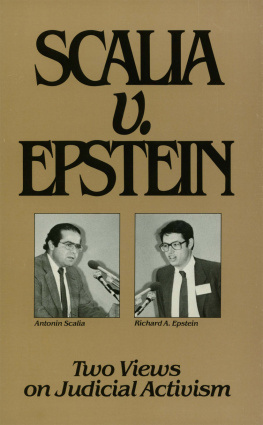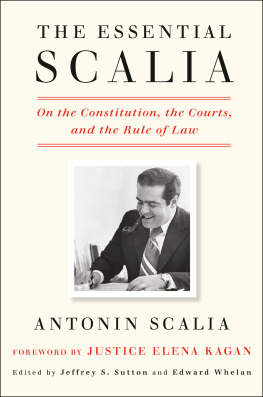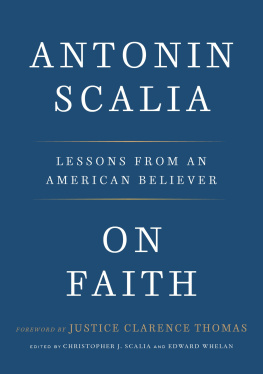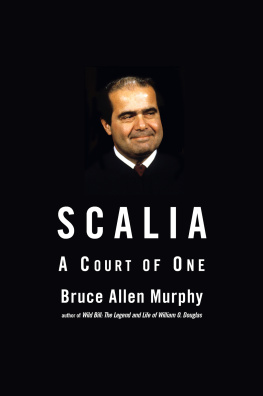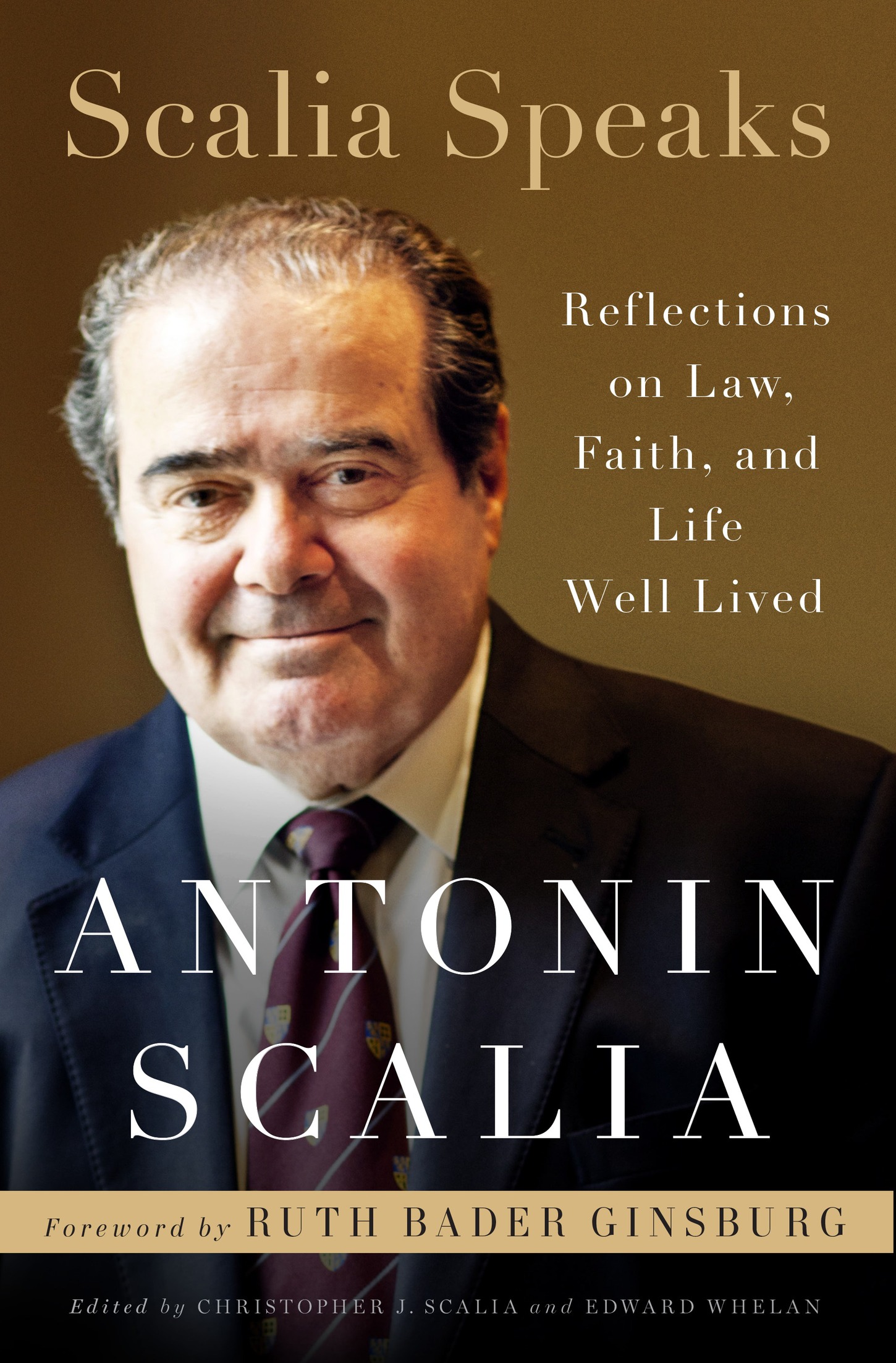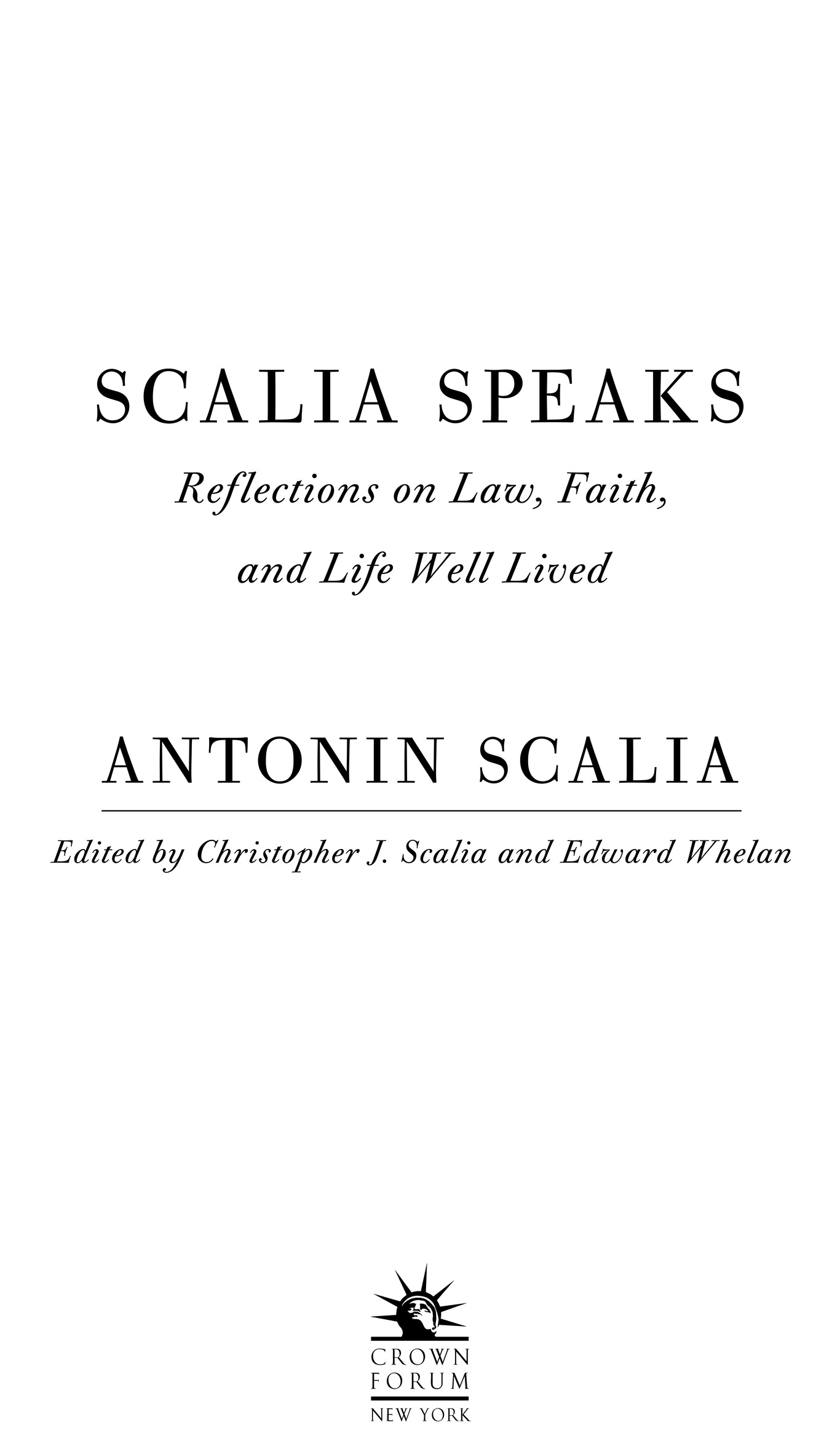Copyright 2017 by Maureen Scalia
Foreword copyright 2017 by Ruth Bader Ginsburg
All rights reserved.
Published in the United States by Crown Forum, an imprint of the Crown Publishing Group, a division of Penguin Random House LLC, New York.
crownpublishing.com
CROWN FORUM with colophon is a registered trademark of Penguin Random House LLC.
Library of Congress Cataloging-in-Publication Data
Names: Scalia, Antonin, author. | Scalia, Christopher J., author. | Whelan, Edward, author.
Title: Scalia speaks : reflections on law, faith, and life well lived / Antonin Scalia, Christopher J. Scalia, Edward Whelan ; foreword by Ruth Bader Ginsburg.
Description: New York : Crown Forum, 2017. | Includes bibliographical references and index.
Identifiers: LCCN 2017034660 (print) | LCCN 2017035374 (ebook) | ISBN 9780525573333 (el) | ISBN 9780525573326 (hardback)
Subjects: LCSH: Scalia, AntoninPolitical and social views. | Judicial opinionsUnited States. | JudgesUnited States. | United States. Supreme CourtOfficials and employees. | Speeches, addresses, etc., American. | BISAC: BIOGRAPHY & AUTOBIOGRAPHY / Lawyers & Judges. | POLITICAL SCIENCE / Government / Judicial Branch. | BIOGRAPHY & AUTOBIOGRAPHY / Political. Classification: LCC KF213.S32 (ebook) | LCC KF213.S32 S32 2017 (print) | DDC 081dc23
LC record available at https://lccn.loc.gov/2017034660
ISBN9780525573326
Ebook ISBN9780525573333
Original photograph by Kainaz Amaria/NPR
Cover design by Darren Haggar
v4.1_r3
ep
Contents
To Maureen Scalia
I have to thank my wife, Maureen, whos an extraordinary woman, and without whom I wouldnt be hereor if I were here, it wouldnt have been as much fun along the way.
A NTONIN S CALIA, on being sworn in to the Supreme Court, September 26, 1986
F OREWORD
By Justice Ruth Bader Ginsburg
I first met Antonin Scalia when he served on the faculty of the University of Chicagos School of Law. He was in Washington, D.C., to deliver a lecture on an issue generating controversy among scholars of administrative law, a field in which then-Professor Scalia was a widely recognized leader. I disagreed, in considerable part, with the substance of his presentation, but his acumen, affability, and high spirits captivated me.
When Professor Scalia was appointed to the United States Court of Appeals for the D.C. Circuit in 1982, the court on which I had served since 1980, I joined my colleagues in welcoming him with delight. He brought his large family to the immediate pre-formal investiture oath taking, a ceremony needed to place him on the federal judiciarys payroll. I recall being uncertain whether Maureen Scalia was his wife or eldest daughter. He held his partner in life in highest esteem and often referred to her as Maureen, the beautiful. A 1960 Radcliffe graduate, Maureen was super smart, also master of the arts of raising children, managing social calendars, sewing haute couture clothes, and gourmet cooking. She and my husband, Supreme Chef Marty Ginsburg, were most popular co-caterers of the Supreme Court spouses quarterly gatherings for lunch in the Natalie Cornell Rehnquist Dining Room (until the addition of two male spouses, the Ladies Dining Room).
My friendship with Judge, later Justice, Scalia was sometimes regarded as puzzling, because we followed distinctly different approaches to the interpretation of legal texts. But in our years together on the D.C. Circuit, there was nothing strange about our fondness for each other. Best friend of our chief judge, J. Skelly Wright, was Circuit Judge Edward A. Tamm. Wright had served as a federal district court judge in New Orleans endeavoring, against massive resistance, to enforce desegregation in education and public transportation. Ed Tamm had been second in command to J. Edgar Hoover at the FBI. Wright was a registered Democrat, Tamm, a registered Republican. Yet the two were so close, they even shopped for clothes together. So it did not seem unusual that my closest D.C. Circuit colleagues were Carter appointee Harry Edwards and Reagan appointees Robert Bork and Antonin Scalia.
Justice Scalia was known for opinions of uncommon clarity and inimitable style, writings that did not disguise his view of the opposing side. Yet, as he put it, he attacked ideas, not people. He was a well-schooled grammarian. Now and then he would call me, or stop by my chambers, to point out a slip I had made in an opinion draft. He did this, resisting circulation of a memorandum, copies to other justices, that might embarrass me. When we disagreed, my final opinion was always clearer and more convincing than my initial circulation. Justice Scalia homed in on all the soft spots, energizing me to strengthen my presentation.
Unlike my dear colleague Elena Kagan, I never sought to join Justice Scalia on his hunting adventures. But we several times traveled abroad together for exchanges with judges and lawyers in other lands. During a visit to India in 1994, I learned of his skill as a shopper. On a day free from judicial interchanges, our driver took us to his friends carpet shop in Agra. One rug after another was tossed onto the floor, leaving me without a clue which to choose. Justice Scalia pointed to one he thought Maureen would like for their beach house in North Carolina. I picked the same design in a different color. It has worn very well.
We shared a passion for opera and were twice supernumeraries at the Washington National Opera. Talented composer, librettist, pianist, and lawyer Derrick Wang wrote a comic opera titled Scalia/Ginsburg, which has been performed, in full or in part, in various venues. In his preface to the published libretto, Justice Scalia described as a high point in his life a spring 2009 evening at the Washington National Operas Ball held at the British Ambassadors Residence. In an elegant and spacious room, Justice Scalia joined two professional tenors at the piano for a medley of songs. He called it the famous Three Tenors performance. Both on and off the bench, Justice Scalia was a convivial, exuberant performer.
Most of all, I prized the rare talent Justice Scalia possessed for making even the most sober judge smile. When we sat side by side on the D.C. Circuit, I occasionally pinched myself hard to avoid uncontrollable laughter in response to one of his quips. On the Supreme Court, where we were separated by a few seats, notes he sent my way elicited a similar reaction.
This collection of speeches and writings captures the mind, heart, and faith of a Justice who has left an indelible stamp on the Supreme Courts jurisprudence and on the teaching and practice of law. The work of his fine hand will both inspire and challenge legions of judges and advocates. If our friendship encourages others to appreciate that some very good people have ideas with which we disagree, and that, despite differences, people of goodwill can pull together for the well-being of the institutions we serve and our country, I will be overjoyed, as I am confident Justice Scalia would be.
Ruth Bader Ginsburg
Associate Justice
Supreme Court of the United States
July 2017
See Associate Spouses in Memoriam, Chef Supreme: Martin Ginsburg (Supreme Court Historical Society 2011).
The libretto, as originally written, appears in 38 Columbia Journal of Law & the Arts


